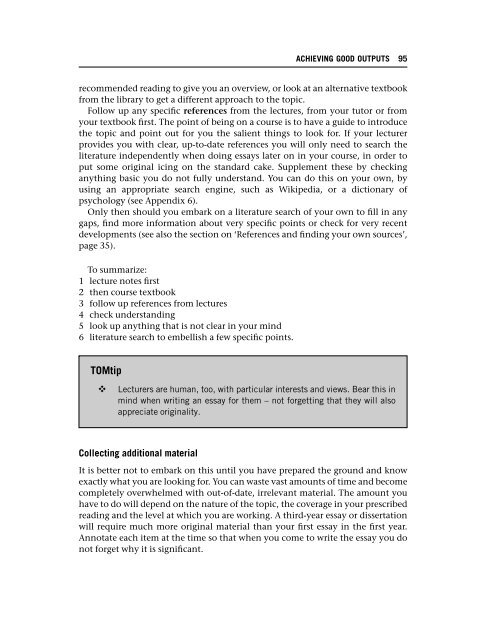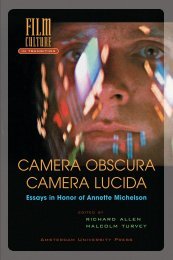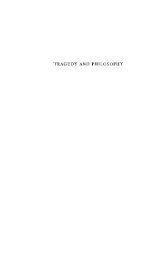Psychology - Forgot your username
Psychology - Forgot your username
Psychology - Forgot your username
Create successful ePaper yourself
Turn your PDF publications into a flip-book with our unique Google optimized e-Paper software.
ecommended reading to give you an overview, or look at an alternative textbook<br />
from the library to get a different approach to the topic.<br />
Follow up any specific references from the lectures, from <strong>your</strong> tutor or from<br />
<strong>your</strong> textbook first. The point of being on a course is to have a guide to introduce<br />
the topic and point out for you the salient things to look for. If <strong>your</strong> lecturer<br />
provides you with clear, up-to-date references you will only need to search the<br />
literature independently when doing essays later on in <strong>your</strong> course, in order to<br />
put some original icing on the standard cake. Supplement these by checking<br />
anything basic you do not fully understand. You can do this on <strong>your</strong> own, by<br />
using an appropriate search engine, such as Wikipedia, or a dictionary of<br />
psychology (see Appendix 6).<br />
Only then should you embark on a literature search of <strong>your</strong> own to fill in any<br />
gaps, find more information about very specific points or check for very recent<br />
developments (see also the section on ‘References and finding <strong>your</strong> own sources’,<br />
page 35).<br />
To summarize:<br />
1 lecture notes first<br />
2 then course textbook<br />
3 follow up references from lectures<br />
4 check understanding<br />
5 look up anything that is not clear in <strong>your</strong> mind<br />
6 literature search to embellish a few specific points.<br />
TOMtip<br />
❖ Lecturers are human, too, with particular interests and views. Bear this in<br />
mind when writing an essay for them – not forgetting that they will also<br />
appreciate originality.<br />
Collecting additional material<br />
ACHIEVING GOOD OUTPUTS 95<br />
It is better not to embark on this until you have prepared the ground and know<br />
exactly what you are looking for. You can waste vast amounts of time and become<br />
completely overwhelmed with out-of-date, irrelevant material. The amount you<br />
have to do will depend on the nature of the topic, the coverage in <strong>your</strong> prescribed<br />
reading and the level at which you are working. A third-year essay or dissertation<br />
will require much more original material than <strong>your</strong> first essay in the first year.<br />
Annotate each item at the time so that when you come to write the essay you do<br />
not forget why it is significant.






